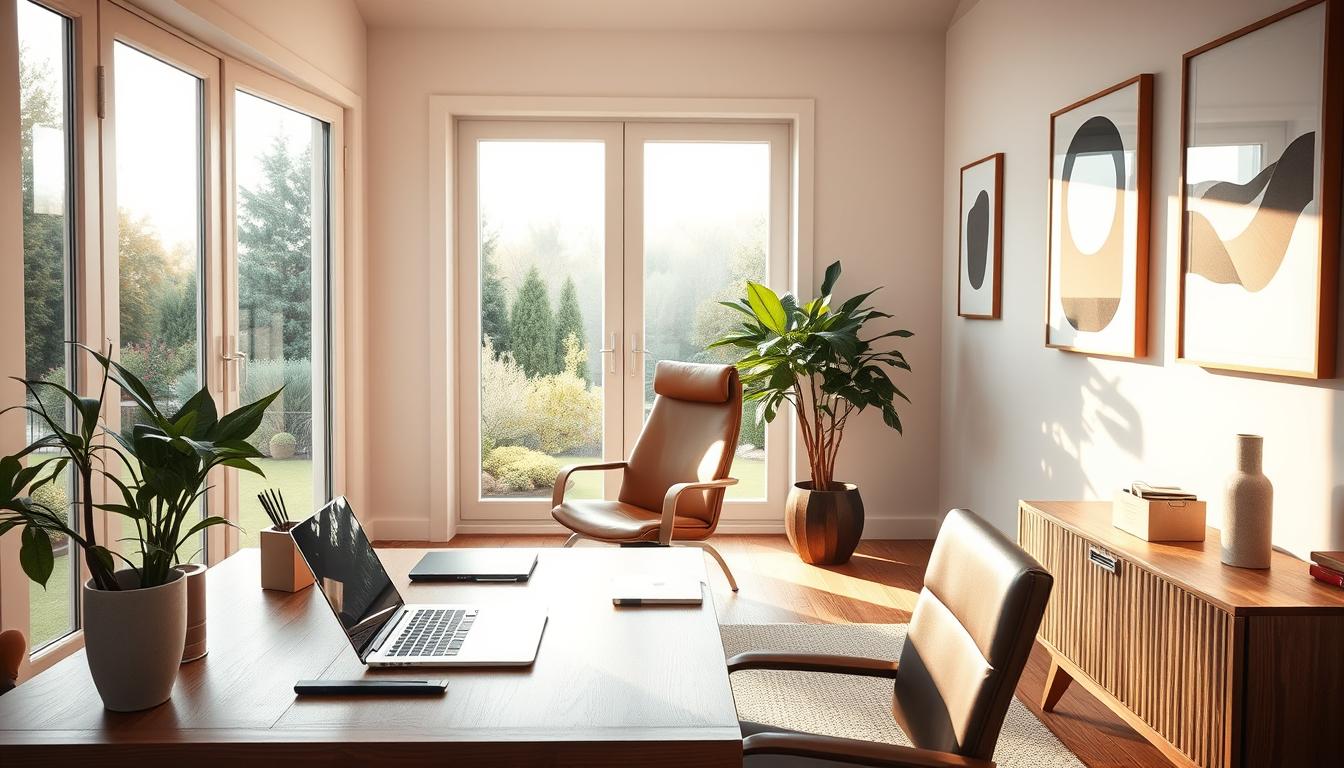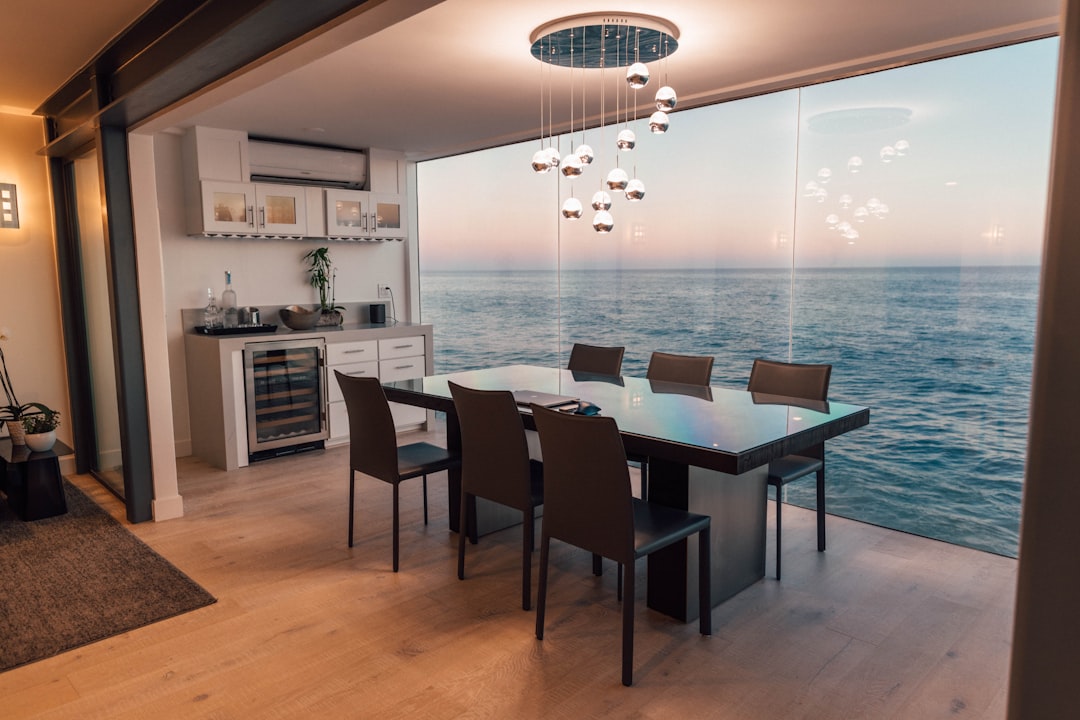Did you know the demand for interior designers is set to rise by 5% in the next decade? Online learning has made it easier than ever to get certified and start a rewarding career in this field.
Earning a certification can be a game-changer for your career. It gives you the skills and knowledge needed to succeed. In this article, we’ll share our top tips on how to earn a certification online and take the first step towards a fulfilling career.
Key Takeaways
- Discover the benefits of getting certified in interior design
- Learn how to choose the best online certification course
- Understand what to expect from an online interior design program
- Get tips on how to succeed in your online certification journey
- Find out how certification can boost your career prospects
Understanding the Benefits of an Interior Design Certificate
Getting an interior design certificate online can lead to new chances. With online learning, it’s easier to get the skills needed for interior design.
An accredited interior design program teaches both creative and technical sides of design. This boosts your skills and makes you stand out in the job market.
Career Opportunities
Having an interior design certificate can really help your career. Here are some jobs you might get:
- Residential Interior Designer
- Commercial Interior Designer
- Interior Design Consultant
- Design Director
With a certificate from an accredited program, you can earn more. Certified interior designers often make more than those without a certificate.
Skill Development
An interior design certificate program teaches many skills. You’ll learn about:
- Space planning and design principles
- Color theory and textiles
- Building codes and safety regulations
- Client communication and project management
These skills make you a versatile interior designer. You’ll be ready for different parts of design projects.
Choosing the Right Online Program
Choosing the right online interior design certification program is important. It affects your future career. With more virtual classes, knowing what to look for is key for a quality education.
Accreditation Matters
Accreditation is crucial when picking an online interior design program. It shows the program meets standards and is recognized by employers. Look for programs accredited by reputable organizations like the National Association of Schools of Art and Design (NASAD) or the Council for Interior Design Accreditation (CIDA).
“Accreditation is not just about meeting minimum standards; it’s about ensuring that the program provides a high-quality education that prepares students for the demands of the industry.” –
Specializations Offered
Programs offer different specializations to match your career goals. You might be interested in residential, commercial, or sustainable design. Choosing a program with a specialization in your area of interest is beneficial. Some programs also offer specializations in niche areas like universal design or historic preservation.
| Specialization | Description | Career Opportunities |
|---|---|---|
| Residential Design | Focuses on designing homes and living spaces | Residential Designer, Home Stager |
| Commercial Design | Focuses on designing office spaces, restaurants, and retail stores | Commercial Designer, Space Planner |
| Sustainable Design | Focuses on eco-friendly and sustainable design practices | Sustainability Consultant, Green Building Specialist |
Course Format Options
Online interior design programs vary in course format. Some offer asynchronous learning, letting you work at your own pace. Others require synchronous participation, with live sessions at set times. Consider your learning style and schedule when choosing a program. Some programs offer a hybrid format, combining online and on-campus sessions.
By considering accreditation, specializations, and course formats, you can find an online interior design certification program. It should meet your educational needs and boost your career in the interior design industry.
Essential Skills for Interior Designers
A successful interior designer needs artistic talent, technical knowledge, and communication skills. They must balance creativity with practical needs.
Creativity and Aesthetic Sense
Creativity is key in interior design. Designers must create spaces that are both functional and beautiful. They need to keep up with design trends and know how to use them.
Having an aesthetic sense means paying attention to details. It’s about knowing how colors, textures, and lighting work together in a space.
Technical Knowledge
Interior designers need technical skills to make their ideas real. They must know about building codes, safety rules, and different materials.
Online courses can teach important technical skills. These include drafting, computer-aided design (CAD), and building information modeling (BIM).
Communication Skills
Good communication is essential for interior designers. They work with clients, contractors, and others to complete a project. They must explain their ideas clearly, handle changes, and manage time.
Strong communication helps designers understand what clients want. This ensures the final design meets their needs.
Top Online Interior Design Programs in the U.S.
Online education has grown a lot, making it easier for those who want to be interior designers. Now, there are many good programs across the U.S. These programs have different specializations and plans to help students learn the skills they need.
Program Reviews
Some schools are known for their great online interior design programs. For example, the New York Institute of Art and Design (NYIAD) has a well-liked online course. It teaches both the creative and technical sides of interior design.
Academy of Art University also has a great program. They offer online courses and degrees in interior design. Their classes help students grow creatively and technically, preparing them for many careers.
Enrollment Requirements
Each program has its own rules for who can join. Most ask for a high school diploma or something similar. Some might also want to see a portfolio or certain classes you’ve taken before.
| Program | Enrollment Requirements | Duration |
|---|---|---|
| NYIAD Online Interior Design Course | High School Diploma, Portfolio | 12-18 months |
| Academy of Art University Online Interior Design Degree | High School Diploma, SAT/ACT Scores | 4 years |
It’s important for those thinking about joining to check the exact needs of each program. These needs can really differ.
Financial Considerations
Thinking about an online interior design certification? It’s key to look at the costs and aid options. This certification is a big step for your career. Knowing the financial side helps you decide wisely.
Tuition Costs
Tuition for online interior design courses varies a lot. It depends on the school, course length, and more. Costs can be from $5,000 to $20,000 or more. It’s smart to compare prices to find a good fit for your budget.
| Program | Tuition Cost | Duration |
|---|---|---|
| Program A | $6,000 | 6 months |
| Program B | $12,000 | 1 year |
| Program C | $18,000 | 2 years |
Financial Aid Options
There are ways to make your online interior design certification cheaper. Look into federal student aid, private scholarships, and employer help. See which ones you qualify for.
Types of Financial Aid:
- Federal Student Aid
- Private Scholarships
- Employer Tuition Reimbursement
Scholarships Available
Scholarships can help a lot with the cost of your certification. Many groups offer them for interior design students. Look into these and apply to help pay for your education.
Understanding the financial side of an online interior design certification helps you plan. It lets you make smart choices for your future.
The Online Learning Experience
Getting an interior design certificate online is different. It needs self-motivation and time management strategies. In the world of virtual interior design classes, knowing what makes online courses good is key.
Key Features of Online Courses
Online interior design programs have many tools and resources. They include video lectures, interactive discussions, and virtual design studios. For example, some use online interior design courses for hands-on design software and techniques.
The flexibility of remote interior design training lets students learn at their own pace. They can go back to hard topics whenever they need. This is great for those with work or family to balance with school.
Time Management Strategies
To do well in online learning, you need good time management strategies. This means setting a study schedule, avoiding distractions, and staying organized. By focusing on tasks and breaking them down, students can keep up and meet deadlines.
- Create a dedicated study space to minimize distractions.
- Set clear goals and deadlines for each study session.
- Use digital tools to stay organized and on track.
By learning these strategies, students can get the most out of their virtual interior design classes. They can reach their educational goals.
Building a Portfolio
A well-crafted portfolio is key for any interior designer. It acts as a visual resume, showing off your skills. Understanding the importance of a portfolio is crucial when you’re working on an interior design certificate online.
Importance of a Portfolio
A portfolio is more than your work; it shows your design philosophy and creativity. It lets employers see if you’re a good fit for their team. By showing different projects, you prove you can handle various tasks.
Key elements of a strong portfolio include clear project presentations and problem-solving skills. It’s important to show you know design principles and can work with different materials and tech.
How to Showcase Your Work
Showing your work well is key to making a good impression. Choose projects that show your skills and achievements. Explain the client’s needs, your design choices, and the results. Use high-quality images and before-and-after photos to show your impact.
Digital tools can make your portfolio stand out. Use software like Adobe Creative Suite for a professional look. Consider a website or platforms for creatives to host your portfolio. This shows you’re tech-savvy and industry-ready.
Platforms for Sharing Designs
In today’s world, having an online presence is a must. There are many platforms for sharing designs and connecting with others. Sites like Behance, Houzz, and Instagram are favorites among designers. They let you show your work, get feedback, and keep up with trends.
When picking a platform, think about your audience and the projects you want to share. For example, Houzz is great for home design and renovation.
By carefully choosing your portfolio and platforms, you can boost your visibility in the interior design world.
Networking in the Interior Design Industry
In the world of interior design, having a strong network is key for moving up in your career. As we dive into online interior design certification, it’s important to see how networking can help. It opens doors to new chances, gives you valuable advice, and keeps you in the loop with trends.
Online Networking Opportunities
The digital world has changed how we connect in the interior design field. Online networking opportunities are everywhere, letting you connect with people all over the globe. Here are some ways to network online:
- Join online forums and discussion groups about interior design
- Take part in webinars and virtual conferences
- Chat with industry leaders and peers on social media
- Post your work and stories on professional networking sites
Using these online tools, you can build a wide network across different areas and specialties in interior design.
Professional Associations to Join
Another great way to grow your network is by joining professional associations. These groups offer members special events, training, and chances to meet others in the field. Some top associations include:
- The American Society of Interior Designers (ASID)
- The National Kitchen and Bath Association (NKBA)
- The Interior Design Society (IDS)
Being in these associations boosts your professional standing and keeps you updated on the latest in the field.
By mixing online networking with joining professional groups, you can build a strong network. This network will support your career and keep you up-to-date with industry news.
Preparing for Certification Examinations
Getting ready for the interior design certification exam needs a smart plan. It’s key to know the exam process, use good study tools, and follow tips for passing.
Exam Overview
The interior design certification exam tests your knowledge and skills. It covers design basics, building codes, and professional practices.
Here’s a quick look at the exam format and what it includes:
| Exam Section | Description | Weightage |
|---|---|---|
| Design Principles | Fundamentals of design, including color theory, lighting, and spatial planning | 30% |
| Building Codes and Regulations | Knowledge of local and national building codes, accessibility standards, and regulatory requirements | 20% |
| Professional Practices | Business practices, ethics, and professional responsibilities | 50% |
Study Resources
It’s important to use good study materials for the exam. Some top choices include:
- Textbooks and study guides made for the interior design certification exam
- Online courses and review programs that cover the exam content well
- Practice exams and quizzes to check your knowledge and find areas to improve
Looking into online interior design courses can help. They offer insights into the exam and its content.
Tips for Success
Here are some tips to help you pass the exam:
- Make a study plan and follow it, setting achievable goals and milestones
- Practice with sample questions and mock exams to boost your confidence and endurance
- Join a study group or online community to work with others and stay motivated
By knowing the exam, using the right study tools, and following these tips, you’ll be ready to pass the interior design certification exam. This will help you reach your career goals.

Career Progression After Certification
Getting your interior design certification opens up new career paths. It’s key to keep growing and stay ahead in your field. This will help you move forward in your career.
Effective Job Search
Looking for the right job requires smart strategies. Use online job sites, attend networking events, and join professional groups. Make sure your resume and cover letter highlight your strengths.
Ongoing Education
Staying updated with trends and tech is crucial. Look into specialized courses or certifications. This boosts your confidence and makes you stand out in the job market.
Long-term Planning
Planning for the long term means setting goals and making a plan. Decide where you want to specialize and how to get there. This way, you can reach your goals and thrive in interior design.



